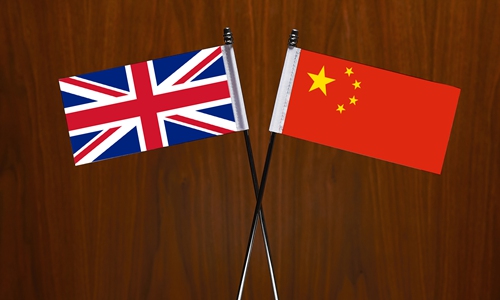Despite discords with China, UK won’t totally tilt toward US
Source:Global Times Published: 2020/5/27 18:59:26

China UK flag Photo: GT
Hong Kong affairs, 5G technology and trade issues have all added tensions to the China-UK relations. The COVID-19 pandemic has further magnified these disputes since the conservatives in the UK have expressed doubts about China. Some even believe that the "golden era" of China-UK ties has come to an end.
In terms of Hong Kong affairs, the UK still has a sense of superiority as a former overlord state. It has not given up interfering in the Hong Kong affairs. For example, former Hong Kong governor Chris Patten said in an article on Monday that, "Britain must take the lead in standing up for Hong Kong" and "we owe it to the people of Hong Kong." Whether it is the illegal "Occupy Central" movement in 2014, last year's social unrests triggered by the now-withdrawn extradition bill, or the formulation of a national security law for Hong Kong this time, the UK has been trying to show off its presence and its so-called responsibility in the city.
This also reflects an ideology that has been dominating Britain's diplomatic strategy. No matter which administration, the UK has been explicitly or implicitly advocating so-called freedom and democracy. However, the national security law for Hong Kong reflects the Chinese central government's determination to safeguard national sovereignty.
As for the 5G technology, some British people believe that the UK should stop "kowtowing" to China, especially those extreme anti-China forces in the Conservative Party. This shows that in the context of China-US competition, the US is adding pressure on the UK. It has also become a trend for the US to collude with other anti-China political forces in the West. However, the UK is still likely to find a balancing point in terms of the 5G issue, considering the technology's application prospects and economic benefits. The UK will need to weigh the 5G issue carefully since it needs to balance relations with all major countries after the Brexit.
Likewise, the UK will also find a balance between China and the US in trade issues. The Trump administration has pressed the UK in their bilateral trade talks to make a choice between China and the US. In fact, Britain values the UK-US free trade agreement because it is a tool to press the European Union and also a part of British Prime Minister Boris Johnson's "Global Britain" mantra. The US also regards the agreement as a tool to oppose China.
However, there are some details in the agreement that Johnson is still unwilling to yield to the US. Thus, the UK needs to weigh the trade issues carefully. After all, China is a large market which is of great importance to the UK in the post-Brexit era. But we still need to be vigilant that Britain may sacrifice China-UK relations to reach the post-Brexit free trade agreement with the US.
The COVID-19 pandemic has shocked Western countries' mind-sets to some extent. They cannot ignore the obviously different results in China's and some Western countries' COVID-19 responses. This has frustrated their sense of superiority. It may lead to the rising of anti-China conservative forces in some Western countries, including the UK. Meanwhile, China's increasing global competitiveness is a sharp contrast to the UK's declining strength. Meanwhile, the string-pulling US is trying its best to rope in its allies to act against China. All of these facts have imposed pressure on Johnson.
However, China and the UK are far away from each other in terms of geopolitics. And China's ascent is not a threat to any country. For Britain in the post-Brexit era, it needs to proactively win China's support. The UK must maintain a delicate diplomatic balance with different major countries otherwise it will be dragged into a dilemma. The UK, unlike Australia, may not completely tilt toward the US.
The article was compiled by Global Times reporter Li Qingqing based on an interview with Dong Yifan, a research fellow with the Institute of European Studies, China Institutes of Contemporary International Relations. opinion@globaltimes.com.cn
Posted in: VIEWPOINT,CHINA-EUROPE,OPINIONS